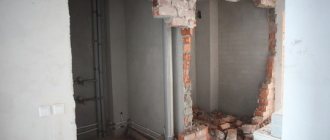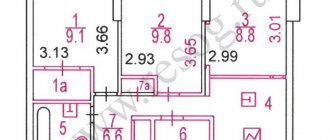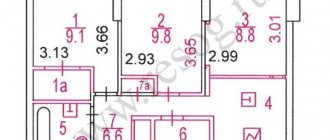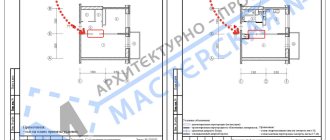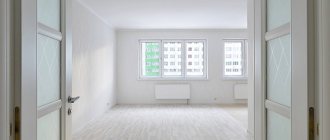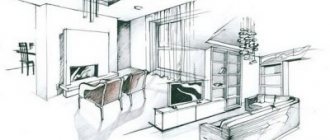Where can I go for information about whether the apartment was redeveloped with permission..?
The exact answer to this question must be looked for in the registration certificate of a particular house in the BTI; it notes all changes in residential premises. The necessary information is contained in the floor plan section with an explanation on the page with the plan of the desired floor and apartment. On this page there may be a resolution “Permission for the re-equipment of the specified premises was not presented to the BTI.” If such a stamp is available, then we can confidently speak of an illegal redevelopment. It will not be possible to buy such an apartment without legalizing the changes.
If there is no such stamp, then most likely the apartment has been changed legally. To verify this, you can flip through the technical passport, open the data with an explanation and see if there is a note on this page containing the housing inspection number about the refurbishment of the premises and the date of issue of the act. The presence of such a mark gives every reason to consider the redevelopment legal, but does not provide information about its details, about what exactly was changed. What kind of architectural solutions were introduced during the refurbishment of the premises can be found out by requesting the corresponding act in the archives of the BTI and the Housing Commission.
Advice: before contacting the BTI to obtain the necessary information, ask the owner if the owner has a registration certificate for the apartment. In most cases, the owner has this document with him when preparing for the transaction, which will allow him to find out about the legality of changes in the layout of the apartment without wasting time. However, during the final check, it is worth checking the relevance of the technical passport in the hands of the seller with what is stored in the BTI archive.
Who needs to check: when can the information be useful?
Information about the approval/non-approval of the reconstruction of the premises may be required in different situations. Such information becomes most relevant in the following cases:
- when repairs are carried out by neighbors;
- if you plan to buy an apartment.
Repair of neighbors
Renovating a neighboring apartment is a common situation in many high-rise buildings. However, in this case, the question arises of how legal the changes in the configuration of the premises made by the neighbor are. In practice, situations often occur when neighbors carry out redevelopment without coordinating it with the competent authorities. This can lead to the following serious consequences:
- disruption of the stability of the entire house due to the complete or partial demolition of a load-bearing wall;
- cracks may appear along the external walls;
- problems with ventilation due to blocked hoods;
- “leakage” of heat from the room due to improperly installed heated floors in a neighbor’s apartment, etc.
To avoid the unpleasant consequences listed above, it is important to ask your neighbor at the stage of starting repair work whether he has received the appropriate permission.
Important. If you suspect that a neighbor is carrying out illegal redevelopment, you should immediately contact the territorial office of the State Housing Inspectorate. Upon receipt of the application, the competent authorities will be required to conduct an inspection.
Buying a home
Another case when it is imperative to check the legality of the redevelopment carried out is the purchase of an apartment.
Buying real estate is a very important step, so it is important to thoroughly check everything, including the availability of permission for the redevelopment. Buying an apartment with illegal conversion is fraught with the following risks:
- In the future, such housing will be very difficult to sell.
- The bank may refuse to provide a mortgage loan for the purchase of such an object.
- At any moment, illegal redevelopment may be discovered and then the new owner will have to restore the apartment to its original form at his own expense.
- If, after the sale and purchase transaction, the new owner of the apartment still decides to legalize the redevelopment, then he will carry out this procedure entirely at his own expense. It should be noted that this is a rather costly undertaking.
Is it possible to legalize a new layout if it has already been done?
If the work performed complies with the standards established by law and does not include prohibited actions, the redevelopment can be legitimized in fact . According to Part 1 of Art. 29 of the RF Housing Code proposes to do this through administrative or judicial procedures. They resort to the help of justice authorities if the administrative procedure for legitimation has proven ineffective.
Where can I find out if changes to the layout of the premises are legal?
Reference. You can conclude whether the redevelopment carried out in the apartment is legal or not by analyzing the documents. We are mainly talking about the floor plan of the BTI.
This document is a drawing of the apartment, made on the basis of measurements made by a technician from the Technical Inventory Bureau. The configuration of doors, partitions, windows in the apartment, as well as the placement of plumbing units is clearly reflected here.
You can conclude that the redevelopment was done illegally based on the following signs:
- The comparison revealed that the actual configuration of the apartment does not coincide with the data from the BTI plan.
- The redevelopment is reflected in the plan, but there is a stamp with the following content: “Permission for the re-equipment was not presented to TBTI” or “The apartment was re-equipped without permission.” Both of these records directly indicate that the change in the configuration of the premises was made without the approval of the authorized bodies.
If the redevelopment has been legalized, then on the third sheet of the technical passport of the apartment in the section “Explication to the floor passport” the details (number and date) of the act of the redevelopment will be indicated.
Deadlines
If you can avoid going to court, the process of legalizing the redevelopment usually takes up to 2 months. Otherwise, the procedure may take up to six months or more. You can focus on the following deadlines:
- creation of a project for redevelopment of premises - from 7 days to 3 months;
- collection of documentation package – from 1 to 7 days;
- consideration of the application at the MFC – up to 45 days;
- receipt of a decision made by the MFC – no more than 3 days;
- waiting for the court hearing – up to 2 months;
- entry into force of the decision of the justice authorities – 1 month;
- procedure for re-registration of documentation – from 3 days.
After receiving a refusal from the MFC, the applicant has only 3 months to file a claim in court.
How should you check the legality of changes?
There are several ways to get an accurate answer to the question of whether a change in the configuration of an apartment is legal or not. We are talking about the following measures:
- You can directly ask your neighbor or the seller of the apartment;
- applying for information to the management company (management company);
- request information from the housing inspectorate.
Each of the above methods has its own implementation features.
Ask your neighbor/seller personally
One of the easiest ways to obtain the information you are interested in is to personally contact your neighbor (the seller of the apartment) with a question about whether he has legalized the redevelopment or not. However, this option has several disadvantages:
- the owner of the apartment may give an answer that does not correspond to reality, that is, deceive (if you do not ask him for documents);
- Even if you ask to see papers confirming the availability of permission for redevelopment, the neighbor/seller of the premises may refuse to provide them.
Thus, a personal appeal to the owner of the apartment with a question about the legality of the redevelopment may not always bring results.
Contact the management company
To obtain such information, you can contact the management company supervising the multi-story building in which the apartment is located.
Attention. According to the established procedure, apartment owners are not required to provide the management company with documents confirming the availability of permission to carry out the planned redevelopment. However, in most cases the management company has such information.
Find out from the housing inspection
The most reliable way to obtain accurate information about the legality of the redevelopment is to contact the housing inspectorate of the relevant region.
To do this, you need to prepare a written request, indicating the exact address of the apartment. The answer will come within 30 days (this period is prescribed in the Law of the Russian Federation “On the procedure for considering appeals from citizens of the Russian Federation”). In addition, to save time, you can make an appointment with the head of the housing inspection and personally obtain the information you are interested in about the apartment.
Thus, in case of purchase or when carrying out renovations in a neighboring apartment, you should definitely inquire if there is official permission to implement the planned configuration changes. You can check the legality of the redevelopment of the premises by sending a request to the housing inspectorate or through the management company. You can also personally ask the apartment owner about this.
THE NEIGHBORS CAME IN
Complaints from neighbors who are worried that someone else's renovations will cause something to collapse in the building are another source of information about illegal conversions in apartments. Employees of organizations serving the house can also “snitch.” For example, a gas worker who came for a scheduled inspection and saw a redevelopment that grossly violated safety rules (for example, a kitchen with a gas stove is combined with a room - but there should be no gas in residential areas).
But, as they say, for example, in the capital's housing inspectorate, most often the residents themselves are vigilant. And it has a basis. There are cases when dashing citizens tried to equip, say, a swimming pool on the third floor of a panel high-rise building - naturally, without any calculations of how this would affect its load-bearing structures.
According to statistics from the Moscow Housing Inspectorate, which is presented on its official website, on average, for every 1000 calls, up to 300 are related specifically to issues of illegal repairs. This is a lot, taking into account the fact that the same authority also deals with complaints about public utilities and payments for housing and communal services. True, on average - according to the results of inspections - only about 10% of complaints are confirmed. (In other cases, it turns out that there is permission for redevelopment or repairs of this kind that do not require approval.)
Complaints from neighbors are far from the main channel of information about changes in housing.
Photo: Roman IGNATIEV
Coming up with a check, however, is not as easy as it seems. The mechanism is like this (not only in Moscow - it is the same for the whole country).
1) First, inspectors establish who the owner of the apartment that is being complained about is. To do this, a request is made to Rosreestr.
2) Next, the owner receives a notification by registered mail - with a request to provide access to the home at a certain time for inspection. If the owner does not receive notification, the inspection may be considered illegal.
3) Only after properly executed requests to allow inspectors in are ignored twice, the inspection has the right to apply for a court order. It will give the right to enter the apartment not “kindly”, with the involvement of bailiffs. That is, they can even break the door.
While these processes are ongoing, some violators manage to get scared and - if the repairs do not involve very complex or illegal work - obtain the necessary permission (usually it takes about a month to approve the redevelopment).
What documents are required to put housing into operation?
Important. After the redevelopment, the owner must call a commission from the housing inspection to inspect the completed construction work and draw up the appropriate report.
At this stage you will need to collect the following documents:
- SRO approval - a construction company engaged in carrying out repair and construction work when remodeling an apartment must have it.
- Contracts concluded with construction organizations for work, the implementation of which is required only if there is a construction permit from the SRO.
- Acts of hidden work - such papers are prepared in relation to construction work, which after finishing becomes invisible. Their main varieties include:
- strengthening the opening in the load-bearing wall;
laying waterproofing;
- sound insulation, etc.
These types of documents are prepared before the work performed is hidden. Signed by the following officials: the contractor (representative of the construction company) and an employee of the design organization.
Acts of hidden work are of the following types:
- act of soundproofing;
- act of waterproofing;
- the act of strengthening the opening of a load-bearing wall, etc.
It should be conducted by a representative of the construction company involved in repairs in a particular premises. This document describes in detail all types of construction work performed. Approximate content:
reference data;
What happens if you buy an apartment after redevelopment, which is not taken into account in Rosreestr
Even if the redevelopment is approved by the Moscow Housing Inspectorate, it is not fully formalized until Rosreestr knows about it. The lack of up-to-date data from Rosreestr can have various consequences, for example from a taxation point of view.
The state calculates taxes based on data contained in Rosreestr. If after redevelopment the area of the apartment has changed, the amount of tax calculated and paid will be incorrect. When the area of the apartment has decreased, you will overpay the tax, but if it has increased, you will pay less than required. This may become clear when selling an apartment - the additional unpaid property tax accrued over the years can turn out to be an impressive amount.
When purchasing an apartment with illegal redevelopment, problems may also arise. If Rosreestr finds out that the redevelopment of the apartment differs from what is indicated in the Unified State Register of Real Estate, registration of the transfer of rights to the apartment may take a long time. Making changes to the Unified State Register of Real Estate after redevelopment sometimes takes months. But these questions do not always come up when completing a sale or purchase.
Problems that clients encounter when contacting BTI on their own
The first and most common problem is getting red lines in the BTI plan, the appearance of which you may not even expect. They arise for two reasons:
- the old apartment plan is stored in the databases, but changes have already taken place in the premises by the tenants before you;
- measurement error by BTI technician.
Remember that everything is important for BTI! Not only significant changes in the redevelopment, but also those that you consider minimal:
- moving the slab;
- modification of the toilet - with a tank or installation;
- availability of a hygienic shower;
- decorative niches or built-in shelves, cabinets;
- installation of non-standard doors - for example, swing doors in the kitchen;
- podiums in the apartment;
- opening with or without door leaf.
All this must be in the apartment if noted in the BTI plan, or absent if it is not in the plan.
The second problem is related to apartments in new buildings, when the BTI database initially does not have a technical passport. You will need to obtain it yourself. How to do this, read the article - obtaining a BTI plan in a new building.
An example of an apartment plan in which red lines were obtained that require additional correction - there are differences between the apartment plan and the real situation are marked in the picture. A BTI technician went to the initial register, measured the room, then we went to the site and noticed several errors. After this, BTI prepared the correct apartment plan.
Where to submit documents
With a ready-made package of documents, you need to contact the Moscow Housing Inspectorate only through the mos.ru portal. All documents are sent electronically. The redevelopment project and the safety report are signed with the electronic signature of the design organization. We will help with this.
You will pick up your documents at the MFC, in the branch that is closest and most convenient to you. You will indicate it when submitting papers.
Legal entities also submit documents through the mos.ru portal, and pick up the originals of the completed papers at the Moscow Housing Inspectorate.
Is it possible and how without trial?
If the redevelopment did not affect the load-bearing structures and did not violate the requirements of the law, it is possible to legalize it without applying to the justice authorities. To do this, the apartment owner needs to come to the MFC branch with a package of necessary documentation.
If necessary, it is possible to legalize the redevelopment after the fact . At the same time, it is important to make sure that the work done does not worsen the living conditions of other people and does not pose a threat of premature deterioration and destruction of the building.
Red lines in the BTI plan
Red lines in the BTI plan indicate illegal redevelopment and reconstruction. They appear after you call a BTI technician to measure your apartment, and he will find uncoordinated demolition of walls, a toilet moved to another location, a moved gas stove, and new openings.
Sometimes red lines on a plan may appear by mistake, for example due to inaccurate measurements by a technician. That is why, in order to avoid unnecessary problems, before calling a technician to your apartment, we strongly advise you to seek free expert advice from APM-1.
on WhatsApp
How much does redevelopment cost at BTI in Moscow?
Is there a fine in the BTI for illegal redevelopment? In what cases is it necessary to make a technical passport? Hello!
